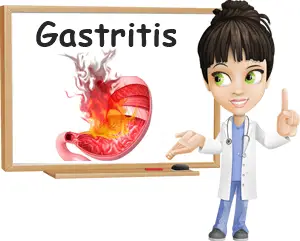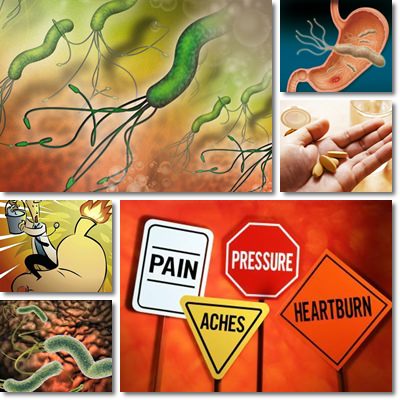Gastritis is a medical condition characterized by the inflammation or irritation of the stomach lining. Irritation of or damage to the stomach lining, infection, injury or erosion all promote inflammation and can lead to the onset of gastritis.
Symptoms may be present or not, mild or severe, and their severity may not testify to how advanced the condition is. According to the severity of the condition, there are two major types of gastritis: acute and chronic.
In its acute form, the condition has a sudden onset, but symptoms usually subside quickly once adequate treatment is received.
Chronic gastritis has much deeper implications, with symptoms manifesting gradually and extending over long periods of time ranging from months to years.
Gastritis is more common with age due to the normal aging process which affects the stomach lining as well. However, stress or poor dietary choices make it common in young adults as well.

Gastritis shares similar symptoms with several other gastrointestinal disorders and conditions, so it might be easy to mistake it for acid reflux disease or symptoms of heartburn.
Making an appointment to see your doctor is the best and easiest solution in view of obtaining a correct diagnosis and choosing the right treatment for you. This being said, read below and find out what are the most common signs and symptoms of the gastrointestinal condition.
Signs and symptoms Of Gastritis
1) Pain in the upper part of the abdomen, usually the middle. It can be dull or sharp.
2) Gnawing sensation in the stomach, often between meals, at night or when hungry.
3) Burning sensation at the level of the stomach.
4) Bloating and gas.
5) Belching. Expelling the air usually does not soothe the pain.
6) Nausea.
7) Vomiting.
8) Upset stomach.
9) Frequent indigestion.
10) Hiccups.
11) Feeling full early in a meal.
12) Appetite loss.
The following symptoms may indicate an advanced, possibly chronic form of gastritis and include: vomiting blood or black material or black, tarry stools.
However, it is important to keep in mind that both symptoms indicate bleeding somewhere along the gastrointestinal tract (the black color of stools is indicative of digested blood) and require immediate medical attention.

What causes gastritis?
As mentioned above, gastritis is the inflammation of the stomach lining so anything that can engender inflammation at the level of the stomach can lead to gastritis. Generally, the most common causes of gastritis are:
1) Helicobacter pylori infection
Helicobacter pylori is believed to be a bacterium that colonized the stomach naturally and its numbers are thought to be kept under control by stomach acids. However, according to researchers, Helicobacter pylori infection is also one of the leading causes of lesions such as gastric ulcers and duodenal ulcers, gastritis and stomach cancer.
2) Bacterial infection
Bacterial infections can cause damage to the stomach and contribute to the onset of gastritis. Viral infections are another possible cause. However, both are less common causes of the condition.
3) Anti-inflammatory and pain relieving medication
Anti-inflammatory medication such as ibuprofen, aspirin, salicylic acid, naproxen, tolmentin, diclofenac etc. taken for long periods of time can erode the stomach lining and encourage the development of gastritis. However, some people may experience gastrointestinal disturbances even when taking analgesics for short periods of time such as one week.
4) Antibiotics
Overuse of antibiotics has been linked with higher risks of developing gastritis. As a person who almost never has to take antibiotics, even a week long prescription can give me acid reflux, stomach acidity and gastritis symptoms.
5) Existing gastrointestinal conditions
Chron’s disease, pernicious anemia, bile reflux, stomach acidity are only a few of the conditions that can lead to gastritis. Chron’s disease, for example, is characterized by more or less severe, but somewhat constant inflammation anywhere along the gastrointestinal tract, hence the higher risk of gastritis for sufferers.
Pernicious anemia is an autoimmune condition that causes vitamin B12 deficiency and involves the immune system attacking the stomach lining. It also increases the risk for stomach cancer.
5) Alcohol and cigarette smoking
Regular consumption of alcohol irritates the stomach lining, leading to inflammation and increasing the risk for gastritis. Alcohol consumption is also responsible for acid reflux and gastroesophageal reflux disease. Smoking can also trigger or worsen gastritis.
6) Stress
As a result of its physiological effects and its lifestyle implications, stress is one of the leading causes of gastritis. In addition to disrupting our normal secretion of certain hormones that regulate the normal functioning of our body, stress also forces us to adopt unhealthy dietary and lifestyle habits that do not benefit gastrointestinal health.
7) Problematic foods and beverages
We are all different and respond differently to various foods. For some of us with a more sensitive stomach, certain foods can prove extremely problematic and upset our stomach greatly. The more we continue to eat them, the more severe our symptoms may become and disorders such as gastroesophageal reflux disease, heartburn or gastritis may develop.
The types of foods I find are best to avoid are spicy foods and spices such as hot pepper powder, pepper or wasabi, coffee, carbonated beverages, deep fried foods or extremely oily foods, dairy products (whole milk especially) as well as certain fruit juices and citrus fruit, vinegar and acidic foods.
At times, eating cabbage, cauliflower, Brussels sprouts or other cabbage family vegetables can upset my stomach as well. For some people, all dairy products may prove problematic, while other may find they have to give up all foods containing gluten. Learn more about what foods to eat and to avoid for gastritis.
How do you know you have gastritis?
An accurate diagnosis can only come from a medical professional, so if you experience any of the above mentioned signs and symptoms, it is best you address your doctor. You doctor will ask you about your symptoms and might further recommend the following tests:
1) Stomach or abdominal ultrasound.
2) Endoscopy. It involves inserting a tiny tube with a camera on top through the mouth in order to examine the stomach.
3) Blood tests, blood cell count and Helicobacter pylori.
4) Stool sample, to look for blood or certain bacteria.
Treating gastritis
Treatment options may vary from person to person, depending on how advanced and bothersome the condition is and whether or not there are complications. Aside from the traditional treatment options your doctor may recommend for you, learning what foods to eat and what foods to avoid can prove wonderfully helpful.
It might help to read my 1 week gastritis diet plan and draw inspiration for dietary changes and meal plans. Your doctor might advise you the following:
1) Antacid medication to soothe mild symptoms.
2) Proton-pump inhibitors for a more potent effect, reducing the production of stomach acid.
They include: omeprazole, esomeprazole, lansoprazole etc. and provide stomach protection.
3) H2 blockers (block histamine production and reduce stomach acid).
4) A combination of antibiotics for treating Helicobacter pylori infection.
5) Dietary changes that involve eliminating all foods that may irritate you, but also coffee, alcohol and smoking.
Conclusion
Gastritis in itself is fairly easy to treat and symptoms subside in a matter of days or, worst, a couple of weeks. Even if your symptoms are not that bothersome and you feel you can live with them, reset that thought and go to your doctor for adequate treatment because once the damage is done, it cannot be undone easily. Or at all. Gastritis is a dangerous condition because of its long-term complications, notably a higher risk for stomach cancer, not to mention low quality of life. As a person who has had gastritis and went through its glorious symptoms in all of their might, all I can say is I am truly happy I went to the doctor.
